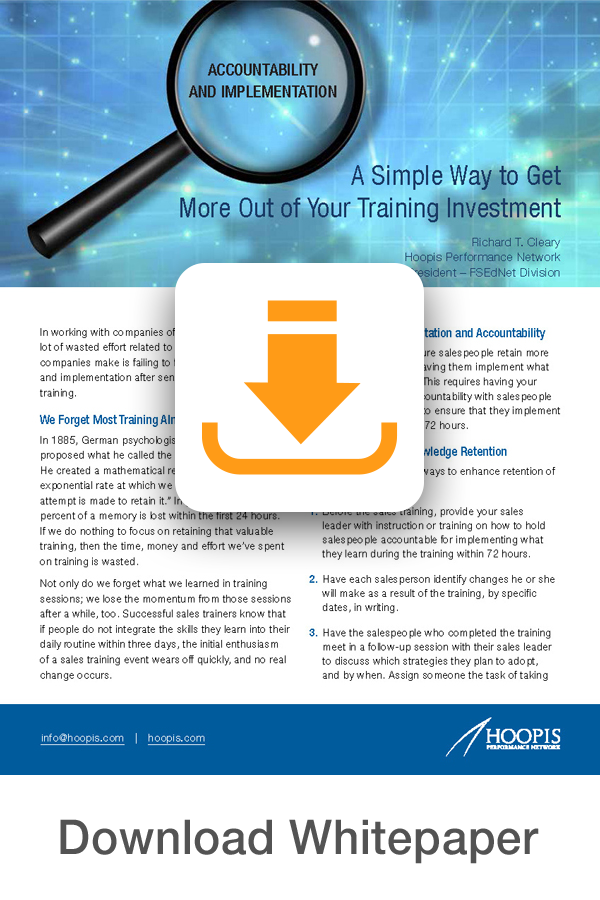A Simple Way to Get More Out of Your Training Investment

In working with companies of all sizes, we see a lot of wasted effort related to training. One mistake companies make is failing to focus on accountability and implementation after sending salespeople through training.
We Forget Most Training Almost Immediately
In 1885, German psychologist Herman Ebbinghaus proposed what he called the “forgetting curve.” He created a mathematical representation of the exponential rate at which we lose a memory “if no attempt is made to retain it.” In general, about 70 percent of a memory is lost within the first 24 hours. If we do nothing to focus on retaining that valuable training, then the time, money and effort we’ve spent on training is wasted.
Not only do we forget what we learned in training sessions; we lose the momentum from those sessions after a while, too. Successful sales trainers know that if people do not integrate the skills they learn into their daily routine within three days, the initial enthusiasm of a sales training event wears off quickly, and no real change occurs.
The Solution: Implementation and Accountability
So how can you make sure salespeople retain more of what they learn? By having them implement what they learned right away. This requires having your sales leaders build in accountability with salespeople who go through training to ensure that they implement what they learned within 72 hours.
Tips for Enhancing Knowledge Retention
Here are some effective ways to enhance retention of that new knowledge:
- Before the sales training, provide your sales leader with instruction or training on how to hold salespeople accountable for implementing what they learn during the training within 72 hours.
- Have each salesperson identify changes he or she will make as a result of the training, by specific dates, in writing.
- Have the salespeople who completed the training meet in a follow-up session with their sales leader to discuss which strategies they plan to adopt, and by when. Assign someone the task of taking notes on these decisions and sending them to the salespeople and sales leader. Have the sales leader follow up on those dates to see if the changes were implemented on time.
- If you have coaches or mentors in your organization, get them involved in this implementation process.
- Measure the effectiveness of the new strategies after a specific amount of time.
Train Sales Leaders on How to Hold Salespeople Accountable
Because implementation and accountability are so important for knowledge retention, it is just as important to train the sales leaders as it is to train the sales force. When you commit to training your first- and second-line managers, they become part of the solution. Teach your sales leaders (1) how to make sure the salespeople implement the new material as soon as they return to the office and (2) how to hold them accountable for doing so. It is important for sales leaders to understand how to implement effective classroom resources, whether local or virtual, as well as the valuable techniques salespeople learn in joint sales calls.
A home office or agency trainer may be responsible for dozens or hundreds of people to train. Many smaller firms do not have a full-time trainer on staff. By investing in sales leaders, both companies and firms can improve their results because the firm’s management team can do its job to make sure the sales force uses the information.
Measure the Training’s Effectiveness
Some training programs are more effective than others. If a training session proves to be of little use, you need to know that so you don’t invest in it again. Here are some ways to measure how effective the training is:
- After six months or one year, ask the salespeople who went through the training to rate it. Create a form for this purpose, and evaluate the collective opinions. Include both quantitative rankings (such as a ranking of 1 to 7 on various aspects of the training), as well as qualitative feedback, to include details about why the training was or was not effective.
- Ask your sales leaders to assess the training session’s overall effectiveness separately. Have them quantify, if possible, the impact the training had on sales so you can compare that number with the cost of the training.
In Summary
To ensure that you’re getting an optimum return on your training investment, make sure salespeople start implementing what they learned within 72 hours. And train your sales leaders on how to hold the salespeople accountable for doing so. Finally, assess the training after enough time has passed to determine its effectiveness. Use that feedback to determine how to spend future training dollars.
Consider Hoopis Performance Network for Advisor Training
Check out Hoopis Performance Network, which features online, ondemand, video-based training built on four Disciplines of Success with access to more than 400 sessions. HPN provides educational and training resources to launch, retool and reenergize all levels of financial professionals and staff. The curriculum is designed to help establish the cornerstones of a producer’s practice to ensure consistent growth and retention through higher levels of productivity.



